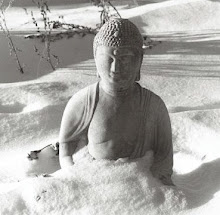The word "save" has a lot of weird baggage and turns off a lot of people as though Buddhists are supposed to fly around like superheroes saving all mere mortals. So perhaps one way to savor more deeply the vow to save all beings is to see it as realizing the unborn original mind--since there is nothing outside this mind. As one Zen teacher put it: "We save the many beings by including them." To save the many beings, then, is to see that, indeed, “the numberless sentient beings are just one good person” (from Zen Dawn, JC Cleary, trns). Then we grock Pai-Chang when he asks: "Where is there a Buddha appearing in the world? Where are there sentient beings to be saved?"
And on good days, ol' Yoda is correct: there is no try. There is only this neighbor who needs help starting his car, this child struggling with homework, this sick dog. There's no sense of me helping you or you needing saving. No separation. Not two. It's more like--oh, this needs tending to and simply acting with no sense of doing or saving and no expectation of repayment or gratitude. Just a natural, spontaneous gesture like smiling or standing up. No one, no thing holding us back. It's simply what manifests when we forget ourselves.
Subscribe to:
Post Comments (Atom)


I prefer the words "free all beings" instead of "save," due to the baggage of the word save. But yes, I think it's true that we need to not separate self and other in activities, or lean too hard in one direction or the other.
ReplyDeleteDoes it work well when chanted? I'd like to see another translation for all 4 vows which included "free all beings." There's an exchange between student and teacher (I can't remember where) which goes: "How do I save the many beings?" The teacher answers: "By including them." And I've heard one translation of this vow which goes, "All beings, one body; I vow to liberate."
ReplyDelete